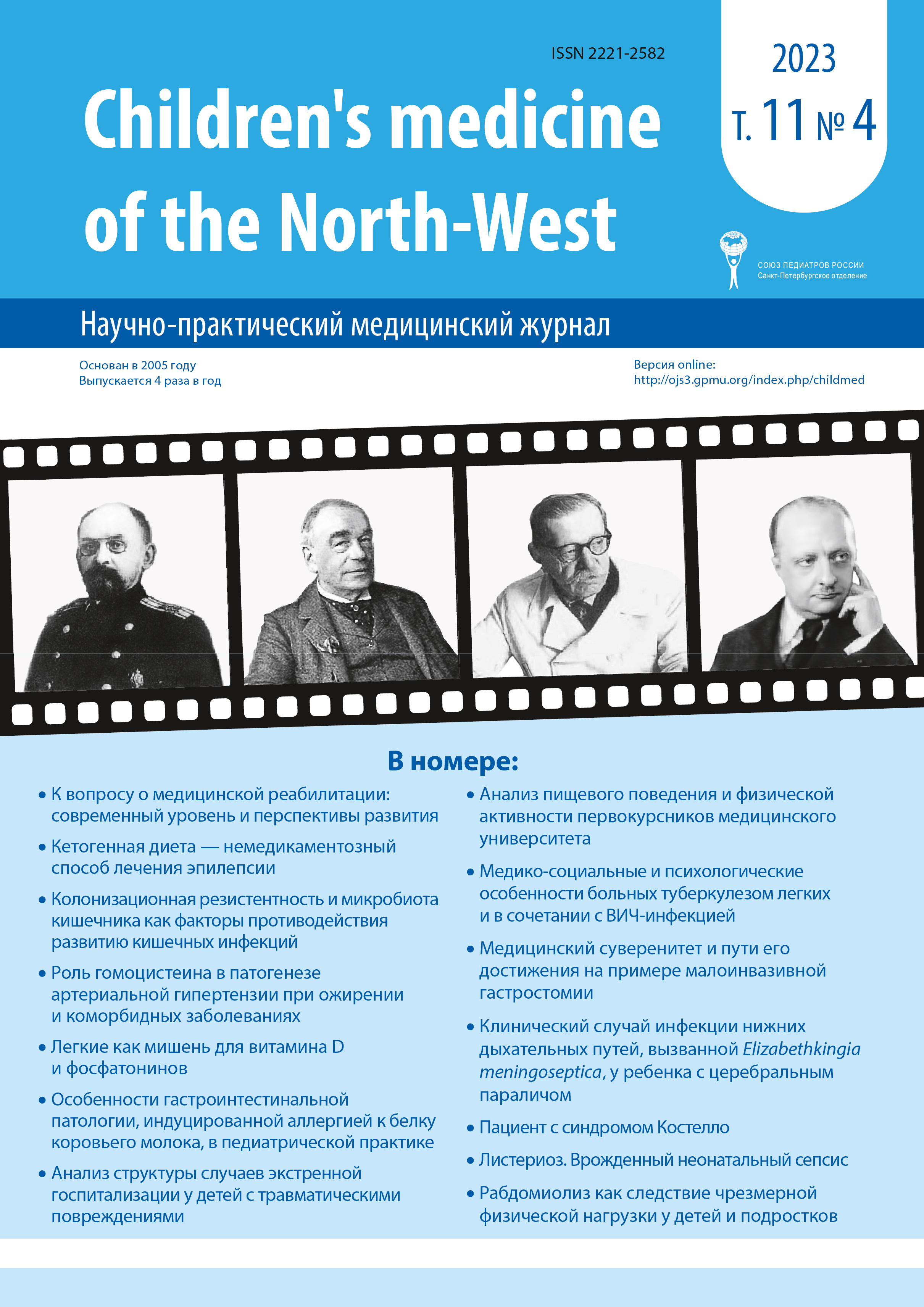ANALYSIS OF EATING BEHAVIOR AND PHYSICAL ACTIVITY OF FIRST-YEAR MEDICAL UNIVERSITY STUDENTS
Abstract
The beginning of student life is associated with signifi cant changes in lifestyle, which can contribute to the emergence/intensifi cation of eating disorders and changes in physical activity, which in turn can be a starting factor for a disadaptation to the learning process. To determine the type of eating behavior and level of physical activity, we studied interview data from 146 fi rst-year medical students. The analysis of nutritional status was carried out based on the mass-growth index. Food behavior was tested using the EAT-26 and DEBQ questionnaires and motor activity was tested using IPAQ, ODA23+ questionnaires. We discovered that a signifi cant number of first-year university students have abnormalities in nutritional status, insuffi cient — 18.7%, overweight — 16.4% of students. Abnormal nutritional symptoms related to cognitive, behavioral, and emotional domains are present in one-third of female students. Restrictive nutrition was considered a risk factor by 26.6%. Approximately eighty percent of female students did not get enough physical activity and sixty percent displayed hypodynamy symptoms. The peculiarities of food behavior and motor activity, combined with the individual characteristics of female students, may be a marker of disadaptation to the educational process in the university.
References
Андриевская С.В., Карницкая А.И. Пищевое поведение и иррациональные установки молодежи. Аспирант. 2021; 6(63): 25–9.
Грицинская В.Л., Новикова В.П., Хавкин А.И. К вопросу об эпидемиологии ожирения у детей и подростков (систематический обзор и метаанализ научных публикаций за 15-летний период). Вопросы практической педиатрии. 2022; 17(2): 126–35. DOI: 10.20953/1817- 7646-2022-2-126-135.
Грицинская В.Л., Губернаторова Т.Ю., Пермякова Е.С., Хавкин А.И. Скрининговая оценка нутритивного статуса школьников, проживающих в различных регионах Российской Федерации. Вопросы практической педиатрии. 2020; 15(1): 30–4. DOI: 10.20953/1817-7646-2020-1-30-34.
Заварухин Н.Е., Безуглый Т.А., Торкай Н.А. и др. Пищевое поведение студентов Южно-Уральского медицинского университета. Научное обозрение. Медицинские науки. 2022; 3: 36–41.
Захарова Е.В. Исследование учебного стресса у студентов медицинского университета. Молодой ученый. 2018; 46(232): 251–2.
Зимина С.Н., Негашева М.А., Синева И.М. Изменения индекса массы тела и повышенного жироотложения московской молодёжи в 2000–2018 годах. Гигиена и санитария. 2021; 4: 347–57.
Лисовский О.В., Гостимский А.В., Карпатский И.В. и др. Перспективы дистанционного обучения при формировании профессиональных компетенций в медицинском вузе. Виртуальные технологии в медицине. 2020; 3 (25): 101–2. DOI: 10.46594/2687-0037_2020_3_1235.
Менгист Г.А., Саввина Н.В., Гржибовский А.М. и др. Нутритивный статус и пищевое поведение студентов университетов: систематический обзор. Социальные аспекты здоровья населения. 2022; 68(5): 11. DOI: 10.21045/2071-5021-2022-68-5-11.
Мешкова Т.А., Митина О.В., Шелыгин К.В. и др. Тест пищевых установок (ЕАТ-26): оценка психометрических характеристик и факторной структуры на неклинической выборке 876 студенток. [Электронный ресурс]. Клиническая и специальная психология. 2023; 12(1): 66–103. DOI: 10.17759/cpse.2023120104.
Прохоров Н.И., Шашина Е.А., Макарова В.В., Матвеев А.А. Изучение показателей двигательной активности студентов медицинского университета. Гигиена и санитария. 2020; 99(8): 816–21. DOI: 10.47470/0016-9900-2020-99-8-816-821.
Терехова А.А., Федотов Н.Д., Ямщикова Т.В. Пищевое поведение студентов медицинского вуза. Modern Science. 2021; 4-2: 129–33.
Шукшина И.В., Иванчиков М.А., Самсонова Е.А. и др. Пищевое поведение студентов в период адаптации в ВУЗе. Образовательный процесс. 2019; 6(17): 19–24.
Burton A.L., Abbott M.J. Processes and pathways to binge eating: Development of an integrated cognitive and behavioural model of binge eating. J. Eat. Disord. 2019; 7: 18.
Global Nutrition Monitoring Framework: operational guidance for tracking progress in meeting targets for 2025. World Health Organization. Geneva. 2018.
Global Nutrition Report.2016. From Promise to Impact: Ending Malnutrition by 2030.World Health Organization. Geneva. 2016.
Gritsinskaya V.L., Novikova V.P., Gurova M.M. Prevalence of obesity among schoolchildren in St. Petersburg. Archives of Disease in Childhood. 2019; 104; S3: A366. DOI: 10.1136/archdischild-2019-epa.866.
Mitchison D., Touyz S., Gonzalez-Chica D.A. et al. How abnormal is binge eating? 18-Year time trends in population prevalence and burden. Acta Psychiatr. Scand. 2017; 136: 147–55.



